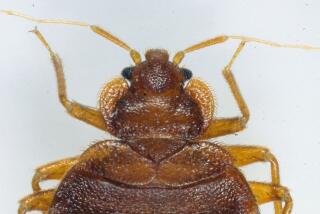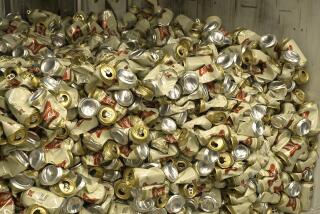French Fleet Fears Scallops From Abroad
- Share via
CAEN, France — What makes a scallop a coquille Saint Jacques? Or, for that matter, when is a sparkling wine Champagne?
Part of the distinction in France is simply the name--names limited to wine and food from a particular region and guarded jealously by French law for decades.
Now, international free trade pressures are forcing France to whittle away at its strict laws on “appelations controlees”--controlled names--and howls of protest are sounding from the Champagne region to fishing towns on the Normandy and Brittany coasts.
In Caen, fishermen like Raphael Leveque are angry that frozen scallops from as far away as Asia can now be marketed as coquilles Saint Jacques, the name once reserved exclusively for the mouth-watering little scallops that have been their livelihoods for centuries.
While coquilles Saint Jacques have distinct flat shells, the scallops inside look similar to those fished out of other waters, and the fishermen fear most consumers will opt for cheaper imports.
“To pass a Chinese scallop--full of water and rubbery, that melts away in the pan--for a coquille Saint Jacques, that’s cheating!” said Leveque, who harvests shellfish on the trawler Capricorne.
If prices fall by one-third, he said, “that means half the fleet will go bankrupt.”
About 1,000 fishing boats on the Brittany and Normandy coast depend on the income, and revenue has already plunged in recent years because of falling catches and cheaper imports of other seafood.
Regulated names have long protected French wines, cheeses and other food products by barring similar imported goods using the same name. But as the world’s fourth-largest exporter, France is grudgingly starting to comply with international rules aimed at removing barriers to trade.
The government previously loosened labeling rules for a few other products, although it has held fast against allowing the sale of wines labeled as Champagne or Bordeaux unless they are from those regions. France also has cut agriculture subsidies because of European Union deregulation.
The demand of foreigners for change is increasingly seen as a threat to what has long been a protected French rural life. Fishermen, farmers and cattlemen hurt by increasingly open markets have staged sometimes violent demonstrations in recent years.
The latest change involves a shellfish family known as pestinides. The Ministry of Agriculture and Fish is now allowing any shellfish in that family, no matter where they are harvested, to be sold in France in frozen or canned form and to be called coquilles Saint Jacques.
Importers previously could use the name Saint Jacques only if they called their products “scallops” rather than “coquilles.” As of Oct. 1, the importers must only mention the country of origin and the scientific name of the species on the product labels.
The change did away with a 1993 French law that fell to pressure from other scallop-exporting countries including Canada, Chile and Peru, which took their complaint to the World Trade Organization. France had faced penalties if it didn’t comply.
If the difference between the two kinds of shells is obvious--the domestic Saint Jacques are flatter--it’s harder to differentiate the fleshy animal inside.
Consumers can tell the difference by the Latin name: pecten maximus for the real Saint Jacques and placopecten magellanicus for the Canadian variety.
Fishermen in Normandy and Brittany fear buyers won’t go to the trouble to check, and the competition will ruin them.
“Expect strong reaction from the fishermen if shell prices collapse,” said Georges Pierron, head of the regional fishermen’s association, in alluding to previous outbreaks of violent protests.
The fishermen also fear that the Saint Jacques catch could fall again this season. After previous annual catches of up to 15,000 tons, the 1995-96 season is projected to total 9,100 tons, down from 11,900 the previous year.
Combined with plunging prices, that could spell disaster for many French fishermen.
“We risk going under,” Leveque said.
More to Read
Sign up for Essential California
The most important California stories and recommendations in your inbox every morning.
You may occasionally receive promotional content from the Los Angeles Times.










